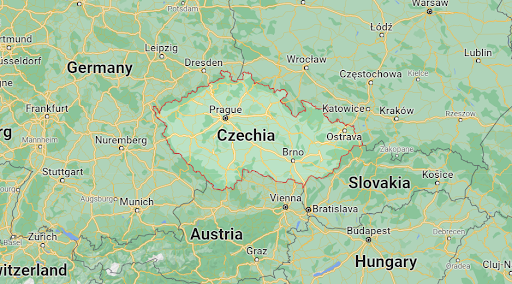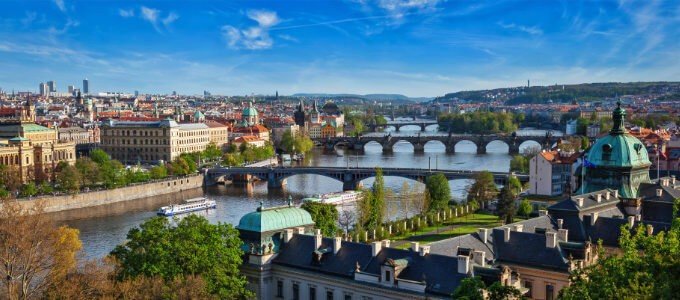Getting Citizenship By Descent is typically the most cost-effective way of obtaining a second passport – if not the fastest. In today’s episode, we unpack how you can obtain Czech Citizenship By Descent in 2022 – and over 1.2 million Americans could qualify…
Join Sovereign Confidential to…
Sharing borders with Germany, Austria, Slovakia and Poland, the Czech Republic, also known as Czechia, has a lot to offer as a Plan B option. Its capital, Prague, is one of the world’s favorite travel destinations, and the country is home to around 2,000 castles – more than any other country in Europe.

The Czech Republic belongs to both the EU and the Schengen Area, and its passport, which scores an “A” grade in the Sovereign Man Passport Index, offers visa-free access to 158 countries around the world.
Add to that a low cost of living and the fact that the country recognizes dual citizenship, and you’ve got very little downside – if any – to becoming a Czech citizen by descent.
The country’s history at a glance
For most of the 20th century, the Czech Republic was part of the larger Czechoslovakia – the union it formed with its southeastern neighbor Slovakia in 1918.
In 1948, as a result of the Second World War, Czechoslovakia became one of the countries behind the Iron Curtain, where it remained until 1989.
In 1989, the Velvet Revolution restored democracy, opening the country to the Western World.
However, this did not solve the growing nationalist sentiments in both the Czech and Slovak territories.
On January 1, 1993, Czechoslovakia split into two independent states – the Czech Republic, and Slovakia.
Today, the Czech Republic is a true European gem. The historical center of Prague, the country’s capital, is a UNESCO World Heritage Site. And the country’s various cities are stunningly beautiful.
How The Czech Citizenship By Ancestry Program works
The Czech Citizenship Act of 2013 (in Czech) stipulates that a child automatically becomes a Czech citizen at birth if at least one of their parents is a citizen of the Czech Republic on the day they are born. The place of the child’s birth is irrelevant.
But more importantly…
Since 2019, the county also allows you to claim Czech citizenship on the basis of ancestry going back two generations (i.e. up to your grandparents’ generation), even if your parents don’t hold Czech passports.
And that’s good news, because over 1.2 million people boast Czech heritage in the US alone. (These people are primarily based in Illinois and Texas.)
As with many other ancestry programs in Europe, it’s irrelevant whether your Czech ancestor is still alive. But you will need to prove that you are connected to them directly by presenting appropriate birth, death and marriage certificates.
The good news is that you do not need to speak the Czech language to be eligible, nor will you have to renounce your other nationalities when becoming Czech. (Since 2014, the country has permitted dual citizenship with no restrictions.)
At the same time, the Czech Republic imposes certain conditions that can affect your eligibility.
First, your parent or grandparent must have been a Czech citizen.
This determination can be tricky to make because Czech citizenship didn’t even exist for most of the 20th century. At the time, Czechoslovak citizenship existed instead.
And only after the two countries split in 1993, did people start obtaining either Czech or Slovak passports. The division was primarily based on the territory where they lived – but with many exceptions.
As a result, if your ancestor left Europe in the middle of the 20th century, still as a Czechoslovak citizen, it may not be too clear which passport – Czech or Slovak – they would have ended up with after the split.
NOTE: You will have to talk to an experienced service provider to establish this. If they determine that your ancestor came from the Slovak side, then the Czech Republic’s ancestry program is not for you. You’d need to investigate your options in Slovakia instead – and we cover the Slovakian program in detail on the pages of Sovereign Confidential (SMC).
Our Sovereign Confidential members also benefit from our rolodex of vetted service providers for all of the major Citizenship By Ancestry programs in Europe.
On the bright side, your ancestor’s ethnicity is irrelevant, because the population of Czechoslovakia was multi-ethnic.
Another important condition for participation in the program – your ancestors must have lost their Czech citizenship on or before December 31, 2013. You will also need to prove this by presenting the applicable documentation.
There were many ways for your ancestor to lose their Czech(oslovakian) citizenship.
For example, if your ancestor naturalized in another country before 2014 – the year when the Czech Republic started allowing dual citizenship. If your ancestor naturalized abroad before that date, in most cases, it constituted an automatic loss of Czech citizenship.
And lastly, to claim your Czech citizenship by declaration, you cannot be a citizen of Slovakia. (And if you are, there is little reason to seek Czech citizenship anyway.)
In terms of your family, according to the law, your kids will obtain Czech citizenship with you (even if they are the third generation). You can include them in your application too.
However, your spouse (or civil partner) will not be as lucky. They will need to be a country resident to apply for naturalization, and they’ll also have to pass a language and history test.
The bottomline
There are no downsides to having the option to live and work as a citizen in more than one place. And if one of those places happens to be the Czech Republic – even better. If beautiful European cities, culture and cuisine is your thing, you certainly won’t be disappointed.








